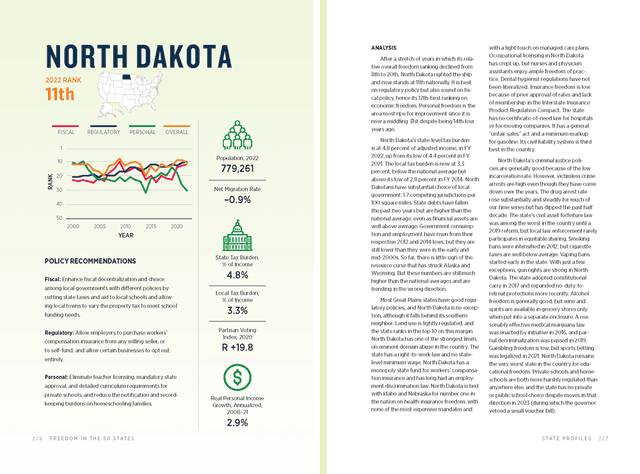Policy Recommendations
- Fiscal Enhance fiscal decentralization and choice among local governments with different policies by cutting state taxes and aid to local schools and allowing local towns to vary the property tax to meet school funding needs.
- Regulatory Allow employers to purchase workers’ compensation insurance from any willing seller, or to self-fund, and allow certain businesses to opt out entirely.
- Personal Eliminate teacher licensing, mandatory state approval, and detailed curriculum requirements for private schools, and reduce the notification and record-keeping burdens on homeschooling families.
Analysis
After a stretch of years in which its relative overall freedom ranking declined from 8th to 20th, North Dakota righted the ship and now stands at 11th nationally. It is best on regulatory policy but also sound on fiscal policy, hence its 12th-best ranking on economic freedom. Personal freedom is the area most ripe for improvement since it is now a middling 31st despite being 14th four years ago.
North Dakota’s state-level tax burden is at 4.8 percent of adjusted income, in FY 2022, up from its low of 4.4 percent in FY 2021. The local tax burden is now at 3.3 percent, below the national average but above its low of 2.8 percent in FY 2014. North Dakotans have substantial choice of local government: 1.7 competing jurisdictions per 100 square miles. State debts have fallen the past two years but are higher than the national average, even as financial assets are well above average. Government consumption and employment have risen from their respective 2012 and 2014 lows, but they are still lower than they were in the early and mid-2000s. So far, there is little sign of the resource curse that has struck Alaska and Wyoming. But these numbers are still much higher than the national averages and are trending in the wrong direction.
Most Great Plains states have good regulatory policies, and North Dakota is no exception, although it falls behind its southern neighbor. Land use is lightly regulated, and the state ranks in the top 10 on this margin. North Dakota has one of the strongest limits on eminent domain abuse in the country. The state has a right-to-work law and no state-level minimum wage. North Dakota has a monopoly state fund for workers’ compensation insurance and has long had an employment discrimination law. North Dakota is tied with Idaho and Nebraska for number one in the nation on health insurance freedom, with none of the most expensive mandates and with a light touch on managed care plans. Occupational licensing in North Dakota has crept up, but nurses and physician assistants enjoy ample freedom of practice. Dental hygienist regulations have not been liberalized. Insurance freedom is low because of prior approval of rates and lack of membership in the Interstate Insurance Product Regulation Compact. The state has no certificate-of-need law for hospitals or for moving companies. It has a general “unfair sales” act and a minimum markup for gasoline. Its civil liability system is third best in the country.
North Dakota’s criminal justice policies are generally good because of the low incarceration rate. However, victimless crime arrests are high even though they have come down over the years. The drug arrest rate rose substantially and steadily for much of our time series but has dipped the past half decade. The state’s civil asset forfeiture law was among the worst in the country until a 2019 reform, but local law enforcement rarely participates in equitable sharing. Smoking bans were intensified in 2012, but cigarette taxes are well below average. Vaping bans started early in the state. With just a few exceptions, gun rights are strong in North Dakota. The state adopted constitutional carry in 2017 and expanded no-duty-to-retreat protections more recently. Alcohol freedom is generally good, but wine and spirits are available in grocery stores only when put into a separate enclosure. A reasonably effective medical marijuana law was enacted by initiative in 2016, and partial decriminalization was passed in 2019. Gambling freedom is low, but sports betting was legalized in 2021. North Dakota remains the very worst state in the country for educational freedom. Private schools and homeschools are both more harshly regulated than anywhere else, and the state has no private or public school choice despite moves in that direction in 2023 (during which the governor vetoed a small voucher bill).

